
Between work and side hustles, picking kiddo number one up at daycare and dropping kiddo number two at the basketball team sleepover, many Americans fail to get enough sleep. And while people may have little say over busy schedules, they do have control over their sleep hygiene habits.
Those who engage in unhealthy sleeping routines increase their risks of developing various diseases. Not to mention it’s miserable to feel poorly rested all the time! Here’s what you need to know about developing good sleep hygiene so you can get some much-needed Zzz’s.
 What Does the Term Sleep Hygiene Mean?
What Does the Term Sleep Hygiene Mean?
Sleep hygiene refers to the practices you develop around bedtime which either positively or negatively impact the quality of your rest. Sound hygiene techniques regulate the body’s biorhythms and help you ease into dreamland. Poor sleep habits, conversely, keep you tossing and turning into the wee hours of the morning and leave you feeling drained.
Steps to Practicing Good Sleep Hygiene
In order to develop sound sleep hygiene, you need to know what to do and what to take a pass on doing. Follow the steps below to improve the quality of your rest:
- Create a comfortable retreat. Your bedroom was made for two things: sleeping and sex. Make your bedroom a sacred space with dimming blackout curtains and other window coverings and a cozy bed piled with comforters and as many pillows as you like. Decorators recommend painting your bedroom colors like lavender or pale blue to boost relaxation.
- Keep the bedroom cool. Sleep experts recommend keeping your bedroom between 60-67 degrees. To cut AC bills, invest in a window unit for the bedroom only or install a ceiling fan to circulate air during the night.
- Aim to keep regular sleep hours. This cannot be stressed enough — to get better sleep, keep a regular schedule. Turn in the same time each night and wake up the same time each morning.
- Eliminate blue light. Keep computers, cell phones and televisions out of the bedroom. The blue light from such devices interrupts normal sleep cycles.
- Face the alarm clock toward the wall. If you tend to keep glancing at the minutes ticking by, turn your alarm clock toward the wall or place it out of reach of the bed facing away if the temptation to glance grows too great.
- Use caution with caffeine and alcohol. Avoid caffeine after 3 p.m. While one alcoholic drink can aid falling asleep, too much imbibing the night before wakes you up to count sheep during the night.
- Get up if sleep proves elusive. Finally, avoid forming a love-hate relationship with your bed by tossing and turning all night. If sleep proves elusive after 15 minutes of lying down, get up, read or do some other quiet activity in another room.
When Should You See a Doctor
If, after developing better sleep hygiene habits, you find you still can’t get adequate rest, schedule an appointment with your primary care physician. You may be suffering from an underlying disorder such as sleep apnea, which causes sufferers to wake up multiple times nightly due to interruptions in air flow. Sleep apnea can prove dangerous, but treatment with a CPAP machine to keep the airway open during the night often resolves the issue, as does losing weight if you’re carrying too many extra pounds.
Once an underlying disorder is ruled out, prescription sleep aids may help you find the rest you need. However, they can prove habit-forming. Those who prefer to treat mild or occasional insomnia naturally can try the following:
- Lavender essential oil. Invest in a bedside diffuser and add a few drops of lavender essential oil at bedtime. The herb is renowned for helping relax the body. Alternately, place a fragrant lavender sachet in your pillow.
- Chamomile tea. Chamomile tea has been known throughout the ages to help ease people into peaceful slumber. Try sipping a cup with honey if sleep proves hard to come by.
- Melatonin. Some people swear by melatonin supplements for regulating sleep cycles, others find scant relief. Since the remedy is natural, there’s little harm in giving it a try.
Better Sleep, Better Quality of Life
When you can’t sleep, your temper grows shorter, your risk of becoming overweight or obese increases and you simply don’t enjoy the best life you can experience. But by developing healthier sleep hygiene habits, you can stop counting sheep and start snoring away blissfully.





Be the first to comment